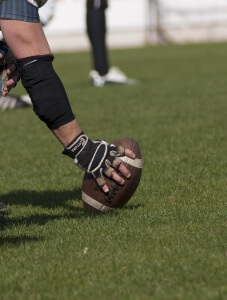Friday Night Lights: Prayer in Football
March 29th, 2016

A Bremerton, WA football coach unapologetically led his team in a post-game prayer after each football game.
Many cases have passed through the American court system that contribute to what we understand to be the current state of First Amendment jurisprudence. These cases together form a structure that is supposed to provide guidance to us as citizens, both lawyers and nonlawyers alike. It is also a part of American culture to question previous mandates of authority figures and to adapt with societal changes. This never-ending curiosity and revolutionary nature is part of what makes us Americans. It also can be confusing. Take for example the most recent controversy that has brought the attention of national media to a small town high school football tradition.
Bremerton, Washington
Before learning of this story with their cup of morning coffee, it is likely that most Americans had not heard of Bremerton, a suburb of Seattle, Washington. Now the name is becoming inextricably linked to the actions of one football coach who unapologetically led his team in a post-game prayer after each football game. The controversy did not begin, however, until after he was ordered to cease this tradition, lest it be perceived by others that the school district endorsed one religion over all others. In a classic case involving the potential breach of the First Amendment’s Establishment Clause, the coach refused to stop his self-created tradition.
According to reports, the coach has prayed (with the students who play football for him) on the 50 yard line after all football games since 2008. He has reportedly stated that he has the right to do so as he is merely exercising his personal right to practice his religion, not acting as a school official or forcing others to pray with him. The coach argues that his ceremony is private and that while students have joined him in his prayers, they are not forced to do so. Others, including the school district, argue that the coach’s privacy argument is in error as he is conducting his prayer on school grounds during a very public display. According to the school district’s position on this activity, the coach has been informed that he is more than welcome to speak with both teams on field after football games but must keep religion out of the conversation.
The backlash from the coach’s refusal to honor the district’s request has led to his suspension and a very interesting protest from an agnostic and atheist group based out of Seattle. During a recent game at the high school, protesters of the prayer ritual were met with vitriol by supporters of the praying coach, yet remained positive following the game as the coach did not pray at the 50 yard line as he had previously done. His suspension was inevitable, however, as he led a group in prayer in the stands following his team’s victory over their opponent. The coach has, in words and actions, taken the position that his personal religious freedoms should be allowed over the objection of others who do not share in his faith but wish to participate in their high school football games.
Watching and Waiting
As this example of religious defiance against the traditions of First Amendment jurisprudence plays itself out, the Universal Life Church will watch and report. Regardless of whether the controversy spills over into the court system or is handled at the school district level, it is likely that we will be seeing more of these types of cases as it has been some time since the Supreme Court has issued a decision on the matter. Until the Justices weigh in, it seems that there will always be lawyers ready and willing to take up the flag of religion in an effort to wave it alongside the Star Spangled Banner.


